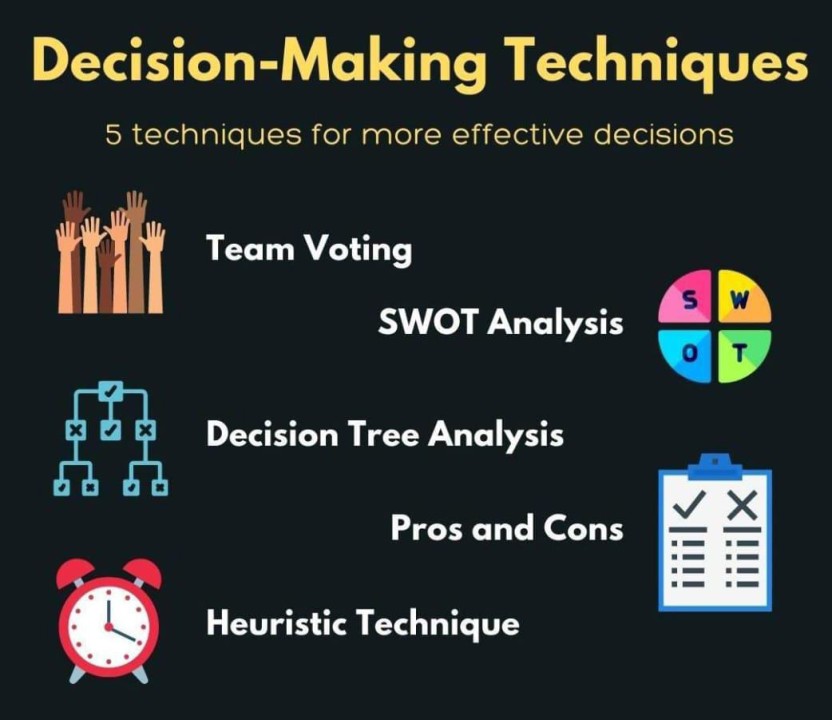Navigating Choices for Success: Strategic Decision-Making
In the complex landscape of business and life, effective decision-making is a skill that can significantly impact outcomes. This article delves into decision-making strategies, providing insights and guidance for individuals and professionals seeking success.
Understanding the Decision-Making Process
Clarity in Objectives
Before diving into decision-making, it’s crucial to have a clear understanding of objectives. Define the goals and desired outcomes to provide a solid foundation for the decision-making process. Clarity in objectives guides the selection of strategies aligned with overarching goals.
Gathering Relevant Information
Informed decisions are built on relevant information. Take the time to gather data, conduct research, and assess the factors that will influence the decision. A comprehensive understanding of the situation is key to making well-informed choices.
Analytical Decision-Making Strategies
SWOT Analysis
SWOT (Strengths, Weaknesses, Opportunities, Threats) analysis is a powerful tool for decision-making. Assessing internal strengths and weaknesses, along with external opportunities and threats, provides a structured framework for evaluating choices. This strategic analysis aids in identifying the best course of action.
Cost-Benefit Analysis
Evaluating the costs and benefits associated with each decision is fundamental. A cost-benefit analysis helps quantify the potential advantages and drawbacks, enabling decision-makers to assess the overall value and feasibility of different options.
Emotional Intelligence in Decision-Making
Recognizing Emotional Influences
Emotions play a significant role in decision-making. Acknowledge and recognize emotional influences to make decisions that align with rational thinking. Being aware of emotional biases allows for a more balanced and objective approach to choices.
Cultivating Empathy
Empathy is a valuable trait in decision-making. Understanding the perspectives and emotions of others involved in the decision fosters collaboration and ensures that choices consider the broader impact on individuals and relationships.
Strategic Decision-Making in Professional Settings
Collaborative Decision-Making
In professional settings, decision-making often involves collaboration. Engage key stakeholders, gather diverse perspectives, and foster open communication to make decisions that benefit from collective expertise. Collaborative decision-making enhances buy-in and implementation success.
Risk Management Strategies
Every decision carries inherent risks. Implementing risk management strategies involves identifying potential risks, developing contingency plans, and mitigating negative consequences. Proactive risk management is integral to successful decision implementation.
Decision-Making Strategies: A Resource for Success
For a comprehensive guide on decision-making strategies and additional resources, visit homecontractorzs.info. Explore expert insights, tools, and success stories designed to empower individuals and professionals in navigating the complexities of decision-making.
Personal Decision-Making in Everyday Life
Time Management and Prioritization
In personal life, effective decision-making contributes to overall well-being. Time management and prioritization are crucial. Assessing tasks, priorities, and personal goals helps allocate time and energy efficiently.
Self-Reflection and Learning
Engage in self-reflection to understand personal values and priorities. Decision-making aligned with one’s core values leads to greater satisfaction. Embrace learning opportunities from both successful and challenging decisions.
Conclusion: Empowering Decision-Makers
In conclusion, strategic decision-making is a cornerstone of success in various aspects of life. Whether in professional settings or personal endeavors, employing these strategies can enhance the quality of choices. For ongoing support and insights, homecontractorzs.info stands as a valuable resource, empowering decision-makers with the tools and knowledge needed to navigate their journeys effectively.

